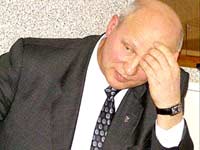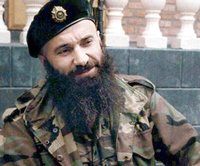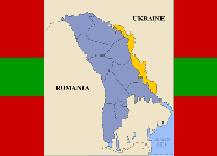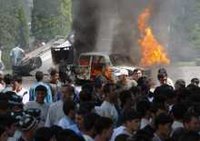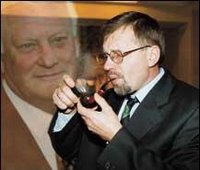 Last Tuesday, Lithuania's Parliament - the Seimas - voted for Gediminas Kirkilas as new Prime Minister. This effectively marks the end of the Brazauskas era in Lithuanian politics, and possibly also a new climate on how to run state affairs. The Seimas' decision to elect Kirkilas as new PM comes after period of political crisis and scandals, which in the end ousted Brazauskas from power at the end of May.
Last Tuesday, Lithuania's Parliament - the Seimas - voted for Gediminas Kirkilas as new Prime Minister. This effectively marks the end of the Brazauskas era in Lithuanian politics, and possibly also a new climate on how to run state affairs. The Seimas' decision to elect Kirkilas as new PM comes after period of political crisis and scandals, which in the end ousted Brazauskas from power at the end of May.Lithuania's new Prime Minister, Kirkilas, is a 54-year old professional Social-Democratic politician with a background in the Communist party - as was also the case of Brazauskas. Until chosen PM, he served as Defence Minister. In contrast to his predecessor, Kirkilas is considered a soft-spoken and EU-oriented politician with good knowledge of English. Furthermore, he still lives with his family in an old Vilnius flat, whereas most high-level Lithuanian politicians have acquired stately mansions on relatively low wages. However, rumours about Kirkilas have already started to surface. Apparently, he has a BA from a party school, which would not have granted him a place at Vilnius university, where he earned his MA. Even though this is comparatively little to form even the nucleus of a scandal, one cannot but wonder what will come in a few months, when this has been disclosed even before coming into office.
The appointment of Kirkilas as Prime Minister ends a lengthy political crisis in the country. Since Brazauskas resignation on 31 May, president Lithuania was edging towards early elections. However, only the Conservative Party wanted early elections, as the other parties feared being cast out of parliament by popular vote. So what remained was to patch up what could be saved and nominate a new PM. Just two weeks before Kirkilas appointment, the president's nomination for the Premiership, Zigmantas Balcytis, was rejected by the Seimas. This was just another proof of the political turmoil that has hit Lithuania this Spring.
In May, first the Social Liberals and then the Labour Party left the Brazauskas-led coalition government, making the PM's position impossible. The Labour Party was also under police investigation on suspicion of having received economic backing from Russian interests and for imbestlement of EU-funds. The Labour Party chairman, Viktor Uspaskich, who had gone into exile in Russia, then resigned the leadership of his party. One of the key scandal factors was the fight for control over the Mazeikiu Nafta oil refinery, which strong Russian interests were keen on buying. Without going too much into details, the heritage Brazauskas left behind was far from enviable.
All the same, it is indisputable that Brazauskas has made great services to his country. As first secretary in the Lithuanian Communist Party, Brazauskas made the party break away from
 Moscow in support of the Lithuanian independence movement. He transformed the party into a modern Social-Democratic party and led it to victory in the 1992 parliamentary elections, once Lithuania's independence had been regained. In 1993, he became Lithuanian president, which he served as until 1998, when he chose not to run for reelection. He was succeeded by present president Valdas Adamkus. Despite the fact that Brazauskas had declared his retirement, he had difficulties to keep out of state affairs, and eventually returned to politics to become Prime Minister in 2001.
Moscow in support of the Lithuanian independence movement. He transformed the party into a modern Social-Democratic party and led it to victory in the 1992 parliamentary elections, once Lithuania's independence had been regained. In 1993, he became Lithuanian president, which he served as until 1998, when he chose not to run for reelection. He was succeeded by present president Valdas Adamkus. Despite the fact that Brazauskas had declared his retirement, he had difficulties to keep out of state affairs, and eventually returned to politics to become Prime Minister in 2001.As Brazauskas has now left the Premiership, many would feel that his retirement is long overdue. In fact, he has been speaking of retirement over the past year, but of course did not realise that it would be forced upon him. Brazauskas great role in the history of Lithuania is arguably also what eventually caught up with him.
During Soviet reign, Lithuania was relatively spared from Russification. Therefore, it was a national communist party in Lithuania that had to come to terms with perestroika in the late 1980s. As the leadership and political class of Soviet Lithuania were almost exclusively of Lithuanian origin, the choice to support independence and reform the party was closer at hand than in most other Soviet republics. However, this also meant that the country's political élite remained almost intact. The consequence was that independent Lithuania inherited the soviet political culture to a greater extent than other republics. It is the effects of this culture that now eventually has caught up with Brazauskas and sealed his fate in Lithuanian politics. Hopefully, Lithuanians will remember him as the leader that brought independence to them, and not for the many scandals that engulfed his last years in office.


